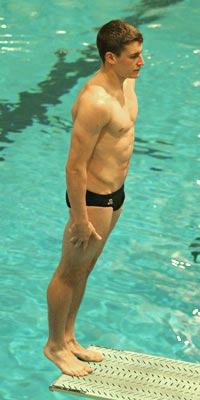NCAA News Archive - 2008
« back to 2008 | Back to NCAA News Archive Index
Army diver perseveres after injury
|
The NCAA News
Sometimes, as the saying goes, it's better to be lucky than good. Army diver Zach McLain is both – and his return to the boards just six months after breaking his neck proves it.
McLain was vacationing with family at his grandparents' cabin in Pennsylvania in July. He along with one of his younger brothers and a cousin were goofing around at a swimming hole near the cabin. On the day McLain's harrowing six-month ordeal began, there was a good bit of joking, goading and one-upmanship going on among the three boys. The mood was light until McLain took a head-first dive off the cliff, hit “something,” was knocked unconscious and floated to the surface. At first, his brother and cousin thought he was still joking. The blood in the water from a cut on McLain's head convinced them otherwise.
While he regained consciousness when his companions rescued him, McLain doesn't remember walking to the car. He was able to answer simple questions – What was his name? Where was he from? – and his memory returned en route to the hospital, leading McLain to believe that perhaps he'd escaped with just a serious cut on his head. X-rays and an MRI told a far different story, however. He had broken four vertebrae in his neck.
As casual as McLain is in recounting the experience now, the reality was grave. Thoughts of what could have happened certainly haven't escaped McLain's family or Army diving coach Ron Kontura. "Zach was a hair away from being paralyzed for life. For what happened to Zach, for him to walk away is nothing short of a miracle."
To that point, doctors told the junior civil engineering major that they'd never seen this type of diving accident not result in paralysis or in the individual becoming a quadriplegic. "They were checking my fingers and toes to make sure I could feel them, and I could feel everything," said McLain. "But, when I saw the x-rays myself, it hit home that it was pretty serious."
In the three days immediately after the accident, McLain was, by his own admission, “out of it.” It wasn't until he returned home and began trying to do everyday things like turn his head that he noticed the pain. However, even with the severity of his injuries, the standout for the Black Knights remained optimistic and was never concerned that he wouldn't make a full recovery. He'd never experienced any numbness or tingling, so he was never afraid of losing any functions related to those symptoms, but he was concerned about his range of motion.
McLain spent eight weeks in a neck brace. He made relatively quick progress, though, and small milestones such as becoming pain free and slowly regaining his range of motion, kept him motivated. He advanced enough to still participate in a cadet exchange program with the Air Force Academy just four weeks after the accident.
Though he initially gave some thought to leaving diving behind, McLain's mother and high school coach offered him another perspective. "In the very beginning, turning my head a little bit was painful and I didn't know how flipping and twisting would feel," he said. "But my mom and my high school diving coach tried to make me see the bigger picture of finishing my diving career in college and it became something I wanted to return to, especially just to compete with the guys on the team again."
So McLain turned his attention to a comeback. Just two weeks after resuming a training regimen, he returned to the boards for Army at a January 19 home meet against Patriot League rival Bucknell, demonstrating that the fall may have broken bones, but not his spirit. He placed third and fourth in the 1-meter and 3-meter competitions, respectively. Reflecting on the results, McLain said he was just happy to be back and plans to use the performance to continuing to improve through the remainder of the season.
Watching McLain throughout the rebuilding process, Kontura has already seen marked improvement. "When we had our training trip to Puerto Rico, Zach came down and was basically doing his own workouts. Each day we would talk and he would say 'I'm going to try this today.' That has been consistently going on since he got back in the water," he said. "His mechanics are better and he is diving better. Little things that last year he took for granted he is focusing on more to do what he needs to do be successful."
For McLain, the journey has reinforced the value of perseverance. "As bad as an injury might seem initially, there's always a way to work through it. You don't have to give up. As long as you persevere and you want to do it again, you'll be able to,” he said.

